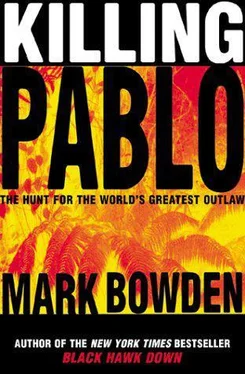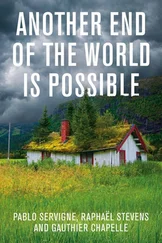Mark Bowden - Killing Pablo - The Hunt for the World's Greatest Outlaw
Здесь есть возможность читать онлайн «Mark Bowden - Killing Pablo - The Hunt for the World's Greatest Outlaw» весь текст электронной книги совершенно бесплатно (целиком полную версию без сокращений). В некоторых случаях можно слушать аудио, скачать через торрент в формате fb2 и присутствует краткое содержание. Жанр: Старинная литература, на английском языке. Описание произведения, (предисловие) а так же отзывы посетителей доступны на портале библиотеки ЛибКат.
- Название:Killing Pablo: The Hunt for the World's Greatest Outlaw
- Автор:
- Жанр:
- Год:неизвестен
- ISBN:нет данных
- Рейтинг книги:3 / 5. Голосов: 1
-
Избранное:Добавить в избранное
- Отзывы:
-
Ваша оценка:
- 60
- 1
- 2
- 3
- 4
- 5
Killing Pablo: The Hunt for the World's Greatest Outlaw: краткое содержание, описание и аннотация
Предлагаем к чтению аннотацию, описание, краткое содержание или предисловие (зависит от того, что написал сам автор книги «Killing Pablo: The Hunt for the World's Greatest Outlaw»). Если вы не нашли необходимую информацию о книге — напишите в комментариях, мы постараемся отыскать её.
Killing Pablo: The Hunt for the World's Greatest Outlaw — читать онлайн бесплатно полную книгу (весь текст) целиком
Ниже представлен текст книги, разбитый по страницам. Система сохранения места последней прочитанной страницы, позволяет с удобством читать онлайн бесплатно книгу «Killing Pablo: The Hunt for the World's Greatest Outlaw», без необходимости каждый раз заново искать на чём Вы остановились. Поставьте закладку, и сможете в любой момент перейти на страницу, на которой закончили чтение.
Интервал:
Закладка:
"Go on."
"But there are many. Around 40 questions."
Escobar told his son he would call back later in the day. "I may find a way to communicate by fax," he said.
"No," Juan Pablo said, apparently concerned that use of a fax would somehow be too dangerous.
"No, huh? OK. OK. So, good luck."
Escobar hung up.
Lt. Hugo Martinez and his special Colombian police electronic tracking team had not been able to assemble in time to chase the signal from this phone call. However, the American technicians at Centra Spike and the Search Bloc's own fixed listening posts had triangulated it to the same Los Olivos neighborhood where the calls had originated the day before.
They hunkered down and waited for the promised next call. If Escobar was going to try to answer 40 questions, he was going to be on the phone a long time.
At precisely 3 p.m. that Thursday, Escobar called his son back.
Juan Pablo again began relaying the journalist's questions. The first asked the son to explain what it would take for his father to surrender.
Escobar instructed, "Tell him: 'My father cannot turn himself in unless he has guarantees for his security.' "
"OK," said Juan Pablo.
"And we totally support him in that."
"OK."
"Above any considerations."
"Yep."
"My father is not going to turn himself in before we are placed in a foreign country, and while the police -"
"The police and DAS is better," interjected Juan Pablo. "Because the DAS are also searching."
"It's only the police."
"Oh, OK."
Pablo, resuming: "While the police -"
"Yeah."
"OK, let's change it to, 'while the security organizations. . .' "
"Yeah."
". . . continue to kidnap . . ."
Lt. Hugo Martinez drove away from his police surveillance unit's temporary staging area in a Medellin parking lot on Thursday, Dec. 2, 1993. His friend on the switchboard at the Tequendama Hotel in Bogota had just alerted him that Pablo Escobar was on the line to the hotel.
Escobar's voice had been recognized right away, even though he was still pretending to be a journalist. He had called the hotel several times to speak with his wife and family staying there.
All of the men at the staging area followed Hugo out. The rest of the Search Bloc was converging on the Medellin neighborhood of Los Olivos, where Hugo's surveillance team had pinpointed the source of Escobar's call.
Excited and nervous, Hugo could feel all of his father's men, hardened veterans of the police assault team, close on his heels. Hugo's reputation with the men in the Search Bloc had improved since his rocky beginning, but they remained skeptical. He knew that if he failed again now, with all these men awaiting his direction, he would never live it down.
The tone in his headphones and the line on his scanner directed Hugo to an office building just a few blocks from the parking lot. He was certain that was where Escobar was speaking. No sooner had he named the address than the assault force descended, crashing through the front doors and moving loudly through the building.
Escobar continued to speak calmly, as though nothing was happening. Clearly the fugitive was not in the office building now being raided.
Hugo felt panic. How could his equipment be wrong? He took two long deep breaths, forcing himself to remain calm. So long as Escobar was talking, he could still be found.
In the passenger seat of the white Mercedes van, Hugo closed his eyes for a moment and then looked again more carefully at the screen, which was no bigger than the palm of his hand. This time he noticed a slight vibration in the white line that stretched from side to side. The line spanned the entire screen, which meant the signal was being transmitted close by, but the slight movement suggested something else.
From experience, Hugo knew this vibration probably meant he was picking up a reflection. It was very slight, which is why he hadn't noticed it before. When the reflection was bouncing off water, the line usually had a slight squiggle in it, but this line had no squiggle.
"This is not it! This is not it!" he shouted into his radio. "Let's go!"
To his left was a drainage ditch with a gently moving stream of dirty water. To get to the other side, where Hugo was now convinced the signal originated, his driver had to go up a block or two and turn left over a bridge.
When the van had crossed the bridge and returned on the other side of the ditch, Hugo realized that only one car from his unit had followed him. There were three men in it. The men in the other car either hadn't heard him or were ignoring him.
Escobar's conversation with his son continued.
Juan Pablo repeated a question from a list of 40 given to him by a Colombian journalist. He and his father were formulating Escobar's replies. This question asked why so many other countries had refused to allow Juan Pablo, his mother and sister entry.
The family, under death threats from the vigilantes of Los Pepes, had been trying desperately to flee Colombia.
"The countries have denied entry because they don't know the real truth," Escobar said, answering the question.
"Yes," Juan Pablo said, evidently taking notes as his father spoke.
"We're going to knock on the doors of every embassy from all around the world because we're willing to fight incessantly," Escobar continued. "Because we want to live and study in another country without bodyguards and hopefully with a new name."
"Just so you know," Juan Pablo said. "I got a phone call from a reporter who told me that President Alfredo Cristiani from Ecuador, no, I think it is El Salvador . . ."
"Yes?" Escobar got up now and moved to the second-floor window, mindful that this conversation had dragged on for several minutes; twenty seconds was his usual limit. As he listened, he looked at the cars moving on the street below.
"Well, he has offered to receive us. I heard the statement, well, he gave it to me by phone," Juan Pablo said.
"Yes?"
"And he said if this contributed in some way to the peace of the country, he would be willing to receive us, because the world receives dictators and bad people, why wouldn't he receive us?"
"Well, let's wait and see, because that country is a bit hidden away."
"Well, but at least there's a possibility, and it has come from a president."
"Look, with respect to El Salvador," Escobar said.
"Yeah?"
"In case they ask anything, tell them the family is very grateful and obliged to the words of the president, that it is known he is the president of peace in El Salvador."
"Yeah."
Escobar stayed at the window, still mindful of the length of the call. When Juan Pablo related a question about the family's experiences under government protection, his father answered: "You respond to that one."
Juan Pablo rattled off three more of the questions, but then his father abruptly ended the conversation. He had seen something on the street below.
"OK, let's leave it at that," Escobar said.
"Yeah, OK," Juan Pablo said. "Good luck."
"Good luck."
"Yeah."
. . and commit massacres in Medellin.' "
"Yes, all right."
"OK," Pablo said. "The next one."
The radio signal pointed Lt. Hugo Martinez straight ahead.
The line on his computer screen lengthened and the tone in his headphones grew stronger as his unmarked police surveillance van moved down a street in a middle-class neighborhood of Medellin on Dec. 2, 1993.
Electronic surveillance from the air and the ground had traced calls made by fugitive drug trafficker Pablo Escobar to this neighborhood. Hugo and his driver were trying to find the exact house. They drove down the street until the signal peaked and then began to diminish, the line pinching in at the edges of the screen and the tone slightly falling off.
Читать дальшеИнтервал:
Закладка:
Похожие книги на «Killing Pablo: The Hunt for the World's Greatest Outlaw»
Представляем Вашему вниманию похожие книги на «Killing Pablo: The Hunt for the World's Greatest Outlaw» списком для выбора. Мы отобрали схожую по названию и смыслу литературу в надежде предоставить читателям больше вариантов отыскать новые, интересные, ещё непрочитанные произведения.
Обсуждение, отзывы о книге «Killing Pablo: The Hunt for the World's Greatest Outlaw» и просто собственные мнения читателей. Оставьте ваши комментарии, напишите, что Вы думаете о произведении, его смысле или главных героях. Укажите что конкретно понравилось, а что нет, и почему Вы так считаете.












